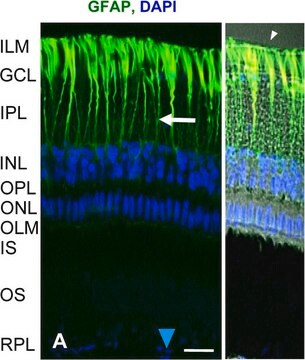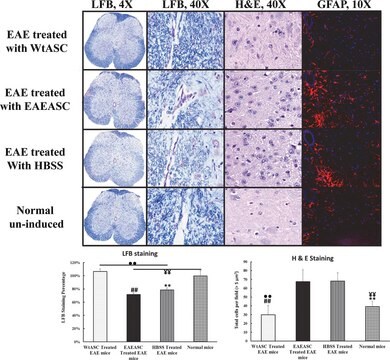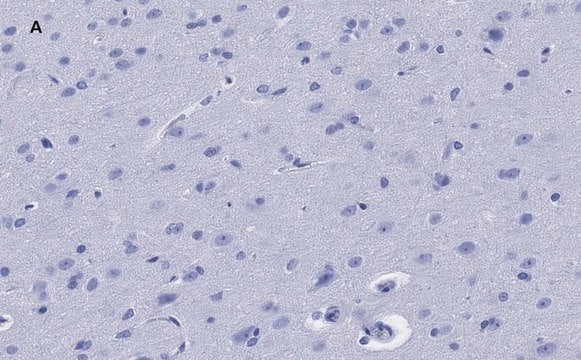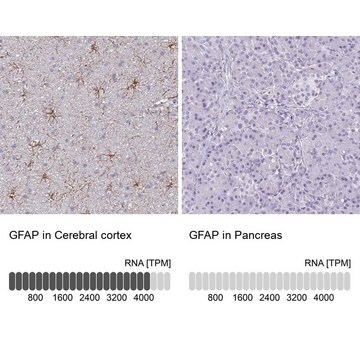345996
Glial Fibrillary Acidic Protein, Human Brain
Synonym(s):
GFAP
Sign Into View Organizational & Contract Pricing
All Photos(1)
About This Item
UNSPSC Code:
12352202
Recommended Products
Assay
≥90% (SDS-PAGE)
Quality Level
form
lyophilized
manufacturer/tradename
Calbiochem®
storage condition
OK to freeze
solubility
distilled water: 1 mg/mL
shipped in
ambient
storage temp.
−20°C
General description
Native, glial fibrillary acidic protein purified from human brain. Main component of the intermediate filaments in astrocytes. Marker of sclerotic plaques in gliosed brain.
Native, glial fibrillary acidic protein purified from human brain. Marker of sclerotic plaques in brain and gliosed brain. Isolated from normal human brain. A component of astroglial intermediate filaments. Forms glial filaments in astrocytes in the central nervous system and in some Schwann cells in peripheral nerves.
Molecular Weight: 43,000-49,000
Molecular Weight: 43,000-49,000
Warning
Toxicity: Standard Handling (A)
Physical form
Lyophilized from 16 mM Sodium Bicarbonate, pH 8.5.
Preparation Note
Prepared from tissues of individuals that have been shown by certified tests to be negative for HbsAg, HIV-1 and HIV-2 antibodies, HCV, and syphilis.
Reconstitution
Following reconstitution, aliquot and freeze (-20°C). Stock solutions are stable for up to 3 months at -20°C.
Other Notes
Anderiva, M., et al. 2001. Glia35, 189.
Masood, K., et al. 1993. J. Neurochem. 61, 160.
Liem, R.K., and Hutchison, S.B. 1982. Biochemistry21, 3221.
Dahl, D. 1973. Brain Res.57, 343.
Masood, K., et al. 1993. J. Neurochem. 61, 160.
Liem, R.K., and Hutchison, S.B. 1982. Biochemistry21, 3221.
Dahl, D. 1973. Brain Res.57, 343.
Legal Information
CALBIOCHEM is a registered trademark of Merck KGaA, Darmstadt, Germany
Storage Class Code
11 - Combustible Solids
WGK
WGK 1
Flash Point(F)
Not applicable
Flash Point(C)
Not applicable
Certificates of Analysis (COA)
Search for Certificates of Analysis (COA) by entering the products Lot/Batch Number. Lot and Batch Numbers can be found on a product’s label following the words ‘Lot’ or ‘Batch’.
Already Own This Product?
Find documentation for the products that you have recently purchased in the Document Library.
Mohamed B Abou-Donia et al.
Brain sciences, 10(9) (2020-09-10)
For the past 30 years, there has been a lack of objective tools for diagnosing Gulf War Illness (GWI), which is largely characterized by central nervous system (CNS) symptoms emerging from 1991 Gulf War (GW) veterans. In a recent preliminary
John E Buonora et al.
Frontiers in neurology, 6, 68-68 (2015-04-15)
Important challenges for the diagnosis and monitoring of mild traumatic brain injury (mTBI) include the development of plasma biomarkers for assessing neurologic injury, monitoring pathogenesis, and predicting vulnerability for the development of untoward neurologic outcomes. While several biomarker proteins have
Mohamed B Abou-Donia et al.
Brain sciences, 11(2) (2021-01-28)
Veterans from the 1991 Gulf War (GW) have suffered from Gulf War illness (GWI) for nearly 30 years. This illness encompasses multiple body systems, including the central nervous system (CNS). Diagnosis and treatment of GWI is difficult because there has
Sharmilee Gnanapavan et al.
PloS one, 8(8), e70019-e70019 (2013-08-13)
Lamotrigine trial in SPMS was a randomised control trial to assess whether partial blockade of sodium channels has a neuroprotective effect. The current study was an additional study to investigate the value of neurofilament (NfH) and other biomarkers in predicting
Our team of scientists has experience in all areas of research including Life Science, Material Science, Chemical Synthesis, Chromatography, Analytical and many others.
Contact Technical Service








